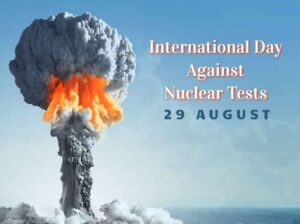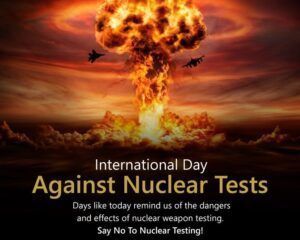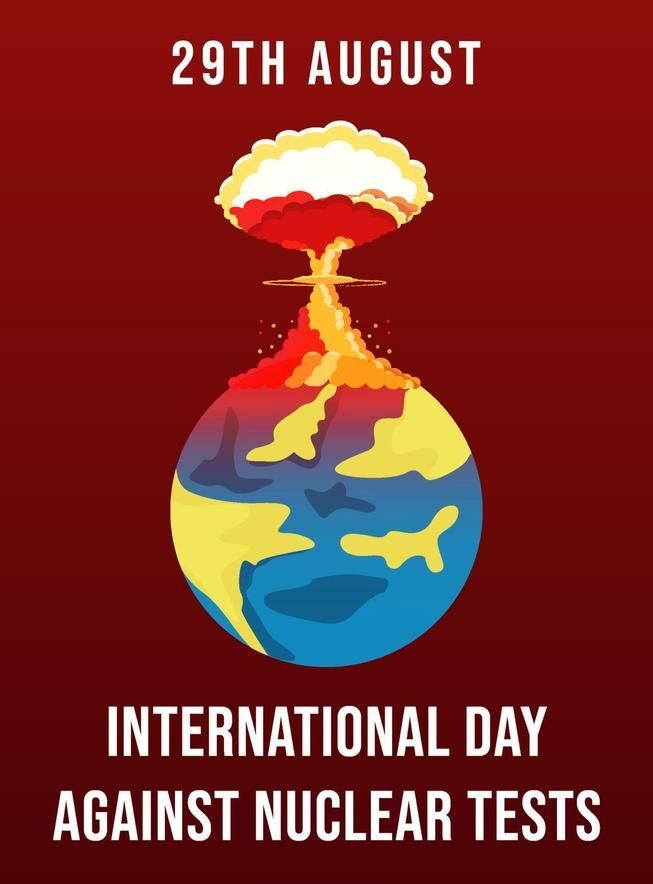International Day Against Nuclear Tests: A Call for Peace and a Safer World
Introduction
Every year on August 29th, the world observes International Day Against Nuclear Tests. This day stands as a reminder of the global efforts to rid the world of nuclear weapons and prevent the testing of these dangerous and destructive arms. It is a day dedicated to the elimination of nuclear weapons and the promotion of peace and security. This observance encourages nations to commit to disarmament, ensuring that nuclear weapons will no longer pose a threat to humanity’s future.
The International Day Against Nuclear Tests was first established by the United Nations (UN) in 2009. It aims to raise awareness about the catastrophic effects of nuclear tests on the environment, public health, and global peace. The day encourages nations to reaffirm their commitments to a nuclear-free world and to work toward global disarmament.
History of International Day Against Nuclear Tests
The origins of this day lie in the decades-long efforts to halt nuclear testing. For much of the 20th century, nuclear weapons were tested extensively, often in remote regions but with serious global consequences. The first atomic bomb test took place in 1945 at the Trinity Test Site in New Mexico, USA. Over the next several decades, more than 2,000 nuclear tests were conducted worldwide, causing widespread environmental degradation, long-term health issues, and a global nuclear arms race.
In response to the dangers of nuclear testing, several international agreements were formed to limit or prohibit these tests. The most significant of these is the Comprehensive Nuclear-Test-Ban Treaty (CTBT), which was adopted by the UN General Assembly in 1996. The treaty aims to prevent any nuclear weapon tests and is a crucial step toward global disarmament.
Despite the CTBT’s adoption, nuclear testing has not been entirely eliminated. As of today, several countries still possess nuclear weapons, and there have been reports of underground nuclear tests conducted in certain regions, such as North Korea. International Day Against Nuclear Tests highlights these ongoing risks and reinforces the importance of continued vigilance and global cooperation in eradicating nuclear weapons.

Key Facts About International Day Against Nuclear Tests
- Global Nuclear Tests Have Lasting Effects: The legacy of nuclear testing continues to impact our planet. Environmental damage, including radiation contamination, is still felt decades after the tests, with radioactive fallout affecting ecosystems, groundwater, and human health. Radiation exposure has been linked to cancers, birth defects, and other serious health conditions in affected regions.
- Over 2,000 Nuclear Tests Have Been Conducted: Since the first test in 1945, over 2,000 nuclear tests have been conducted by various nations, particularly during the Cold War period. These tests often took place without regard for the long-term consequences on human lives and the environment.
- The CTBT Aims to Ban Nuclear Testing: The Comprehensive Nuclear-Test-Ban Treaty (CTBT), although not yet in force due to some countries not ratifying it, represents a major milestone in global efforts to stop nuclear testing. The treaty bans all forms of nuclear explosions and has been signed by 185 countries.
- The Need for Global Cooperation: The International Day Against Nuclear Tests highlights the importance of international cooperation. As long as some nations continue to test nuclear weapons, global peace and security remain at risk. The day encourages all countries to sign and ratify the CTBT and to take concrete steps toward disarmament.
- The Ongoing Threat of Nuclear Testing: Despite international efforts, some countries continue to conduct nuclear tests. The most recent series of tests were carried out by North Korea, which defied global efforts to halt its nuclear weapons program. This threat reminds us that the mission to eliminate nuclear testing is far from over.
Significance of International Day Against Nuclear Tests
- Promoting Peace and Security: The day serves as a call to action for all nations to reaffirm their commitment to a world free of nuclear weapons. By commemorating this day, individuals and governments emphasize the importance of peace, stability, and security for the future of humanity.
- Raising Awareness of the Dangers of Nuclear Weapons: Nuclear weapons pose a grave threat not only to national security but to the entire planet. Their destructive power, coupled with the lasting environmental damage caused by testing, makes nuclear weapons one of the most dangerous creations in human history. This day helps to educate people about the long-term impacts of nuclear tests and weapons on human health and the environment.
- Encouraging Global Disarmament: The observance of International Day Against Nuclear Tests urges all countries, especially those with nuclear capabilities, to work toward disarmament. It calls for the total elimination of nuclear weapons through diplomacy and treaties to ensure a safer world for future generations.
- Honoring the Victims of Nuclear Testing: The day also serves as a way to remember and honor those affected by nuclear tests. People living in test regions have suffered immense health and environmental consequences. This day acknowledges their struggles and calls for justice and support for the victims.
- Strengthening International Agreements: By observing this day, nations are reminded of the importance of adhering to existing agreements like the CTBT and taking steps to ensure that nuclear testing is not conducted in the future. It encourages countries to work together to create a global consensus against nuclear testing.
How to Observe International Day Against Nuclear Tests
- Attend or Organize Events: Many countries and organizations host events to mark the occasion. These can include peace rallies, disarmament seminars, documentary screenings, and vigils for the victims of nuclear testing. Engaging in these activities helps raise awareness and promote the goals of the day.
- Advocate for Nuclear Disarmament: Support organizations that advocate for nuclear disarmament and the signing of the Comprehensive Nuclear-Test-Ban Treaty. You can help by raising awareness on social media, signing petitions, or writing to your political representatives.
- Educate Yourself and Others: Take the time to learn more about the consequences of nuclear tests, the history of nuclear weapons, and ongoing disarmament efforts. Share this information with others through discussions, blog posts, or social media platforms.
- Participate in Peace Initiatives: Engage with peace-building organizations that are actively working toward a world free of nuclear weapons. By volunteering or donating to these causes, you can directly contribute to global disarmament efforts.
- Spread the Message on Social Media: Use social media to spread the message about the dangers of nuclear testing and the importance of working toward a nuclear-free world. Sharing facts, articles, and personal stories about nuclear testing can help broaden the conversation and engage a wider audience.

FAQs about International Day Against Nuclear Tests
1. Why is International Day Against Nuclear Tests important?
It is a day dedicated to raising awareness of the dangers of nuclear testing, advocating for nuclear disarmament, and encouraging international cooperation to prevent further nuclear explosions that harm the environment and human health.
2. What are the main goals of the International Day Against Nuclear Tests?
The main goals are to promote global peace and security, raise awareness about the lasting impacts of nuclear tests, encourage nations to adopt disarmament treaties like the CTBT, and honor the victims of nuclear testing.
3. How can I participate in the observance of this day?
You can attend or organize events, advocate for nuclear disarmament, educate yourself and others about nuclear weapons, and engage in peace initiatives or social media campaigns to raise awareness.
4. Has nuclear testing been eliminated worldwide?
No, while progress has been made, some countries still conduct nuclear tests. The Comprehensive Nuclear-Test-Ban Treaty (CTBT) seeks to ban all nuclear explosions, but it is not yet in force as some countries have not ratified it.
Conclusion
International Day Against Nuclear Tests is not just a day of remembrance but a call to action. It highlights the global commitment needed to eradicate nuclear weapons, prevent further testing, and promote a world where peace and security are the cornerstones of international relations. By observing this day, we strengthen our resolve to create a safer, more peaceful world for future generations, free from the threat of nuclear war and the environmental devastation caused by nuclear tests.










